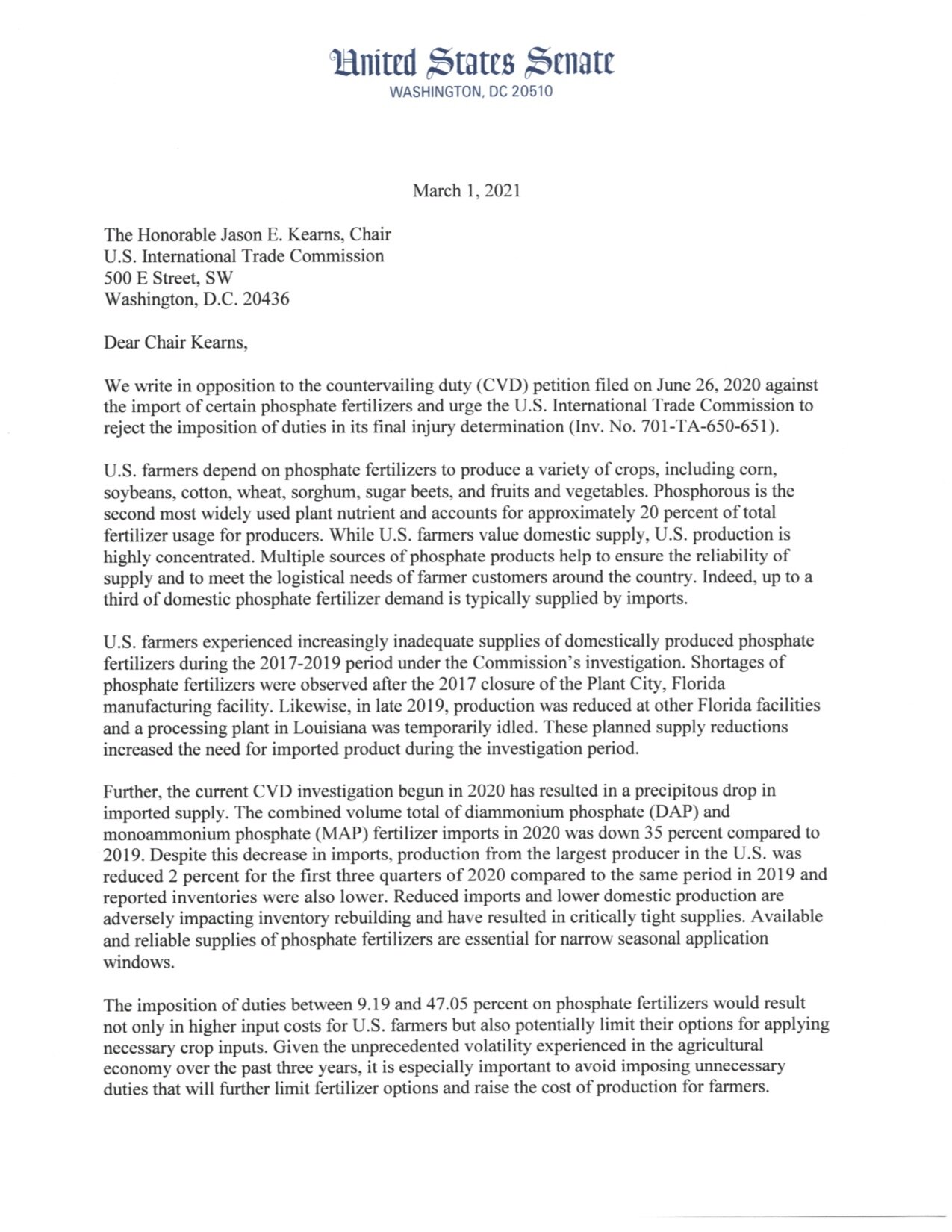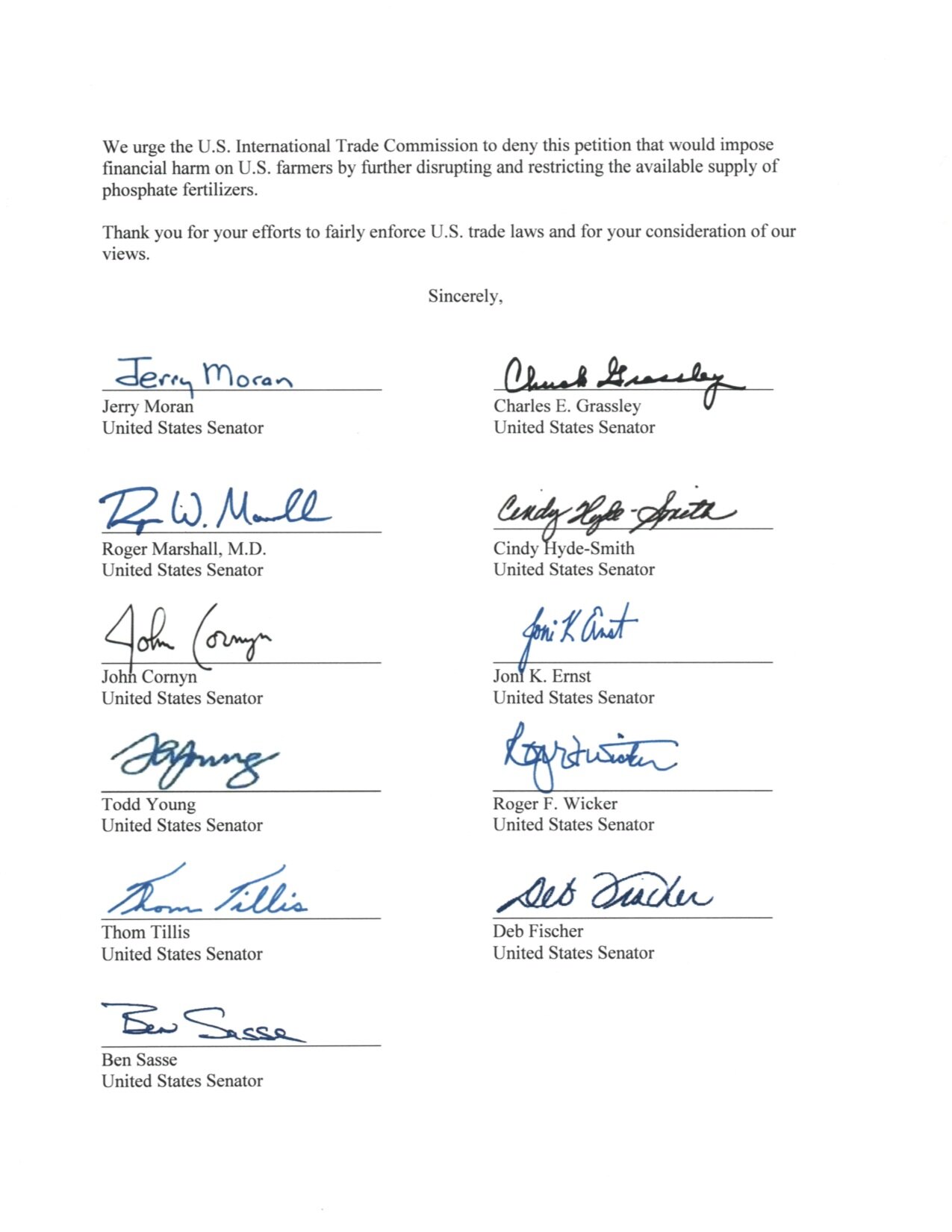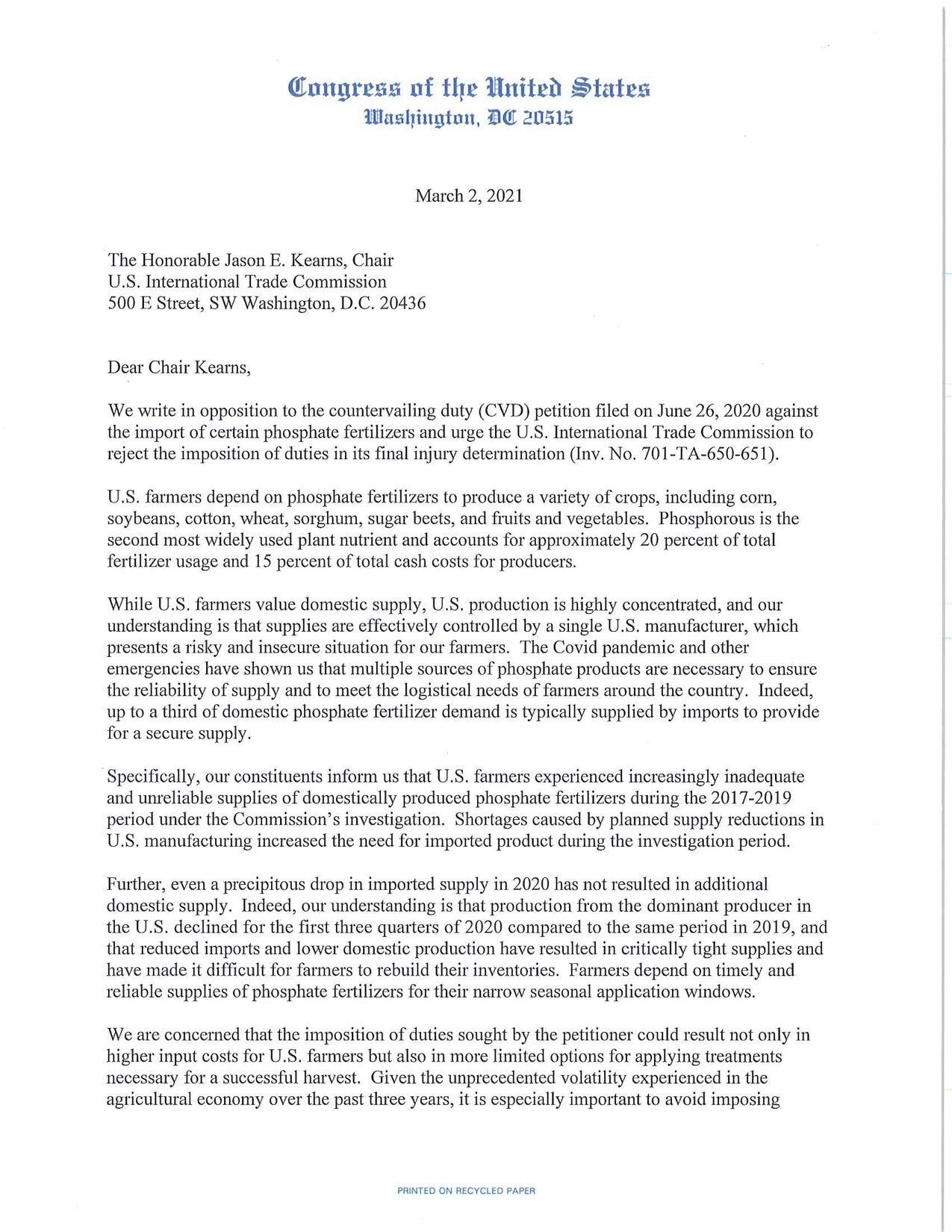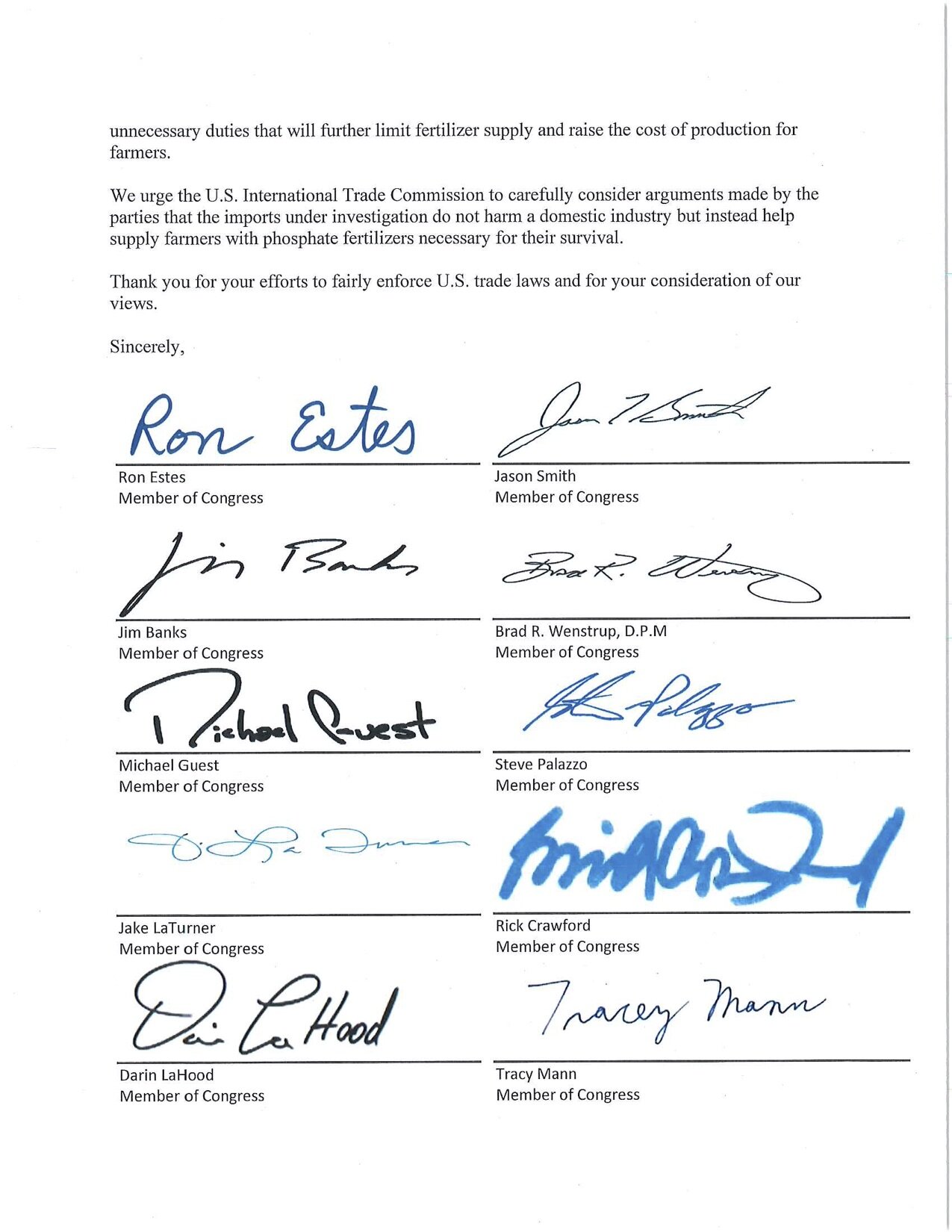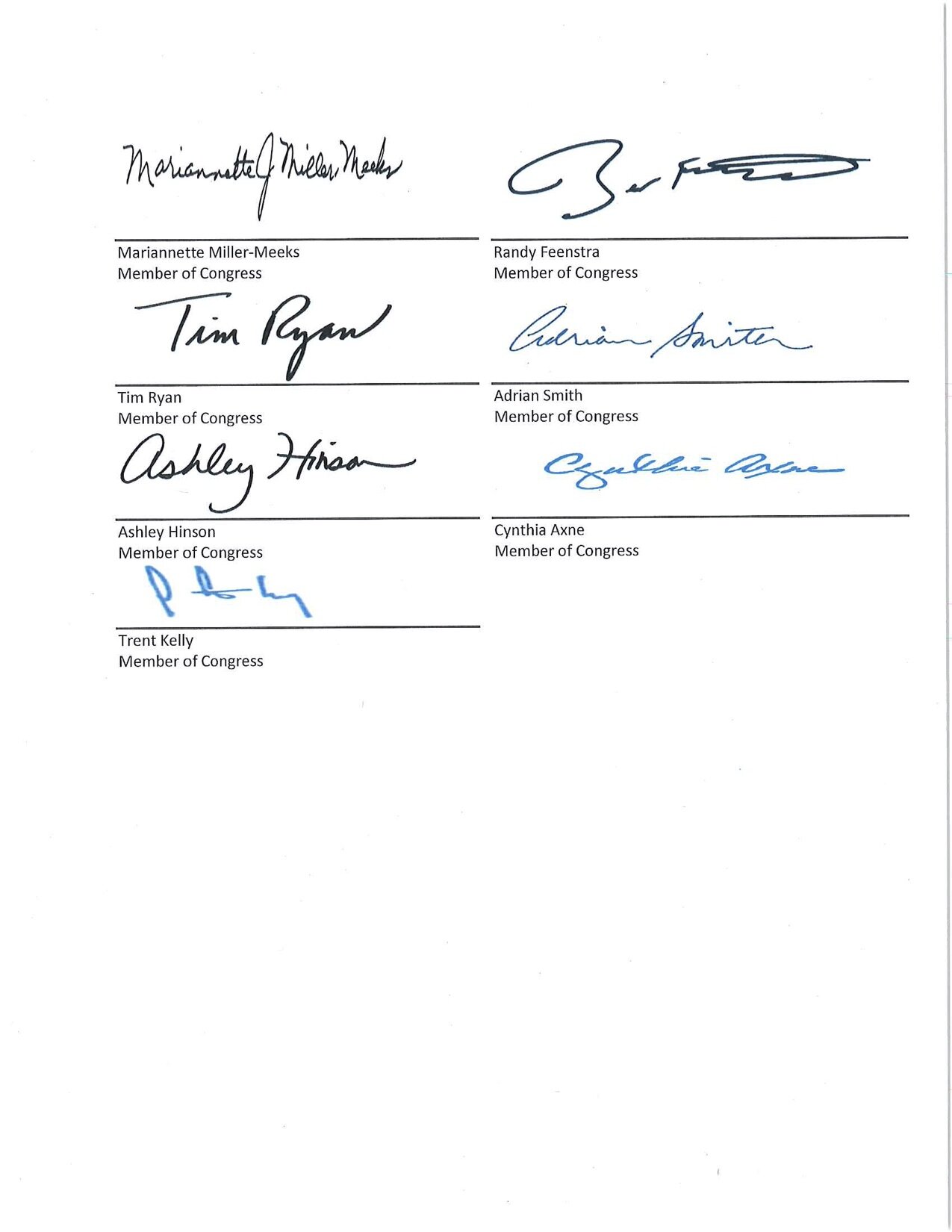Punitive Biden Phosphate Tariff on Morocco Hurts Farmers, Grocery Consumers
The United States under the Biden Administration’s Department of Commerce is moving once again to raise tariffs on phosphate fertilizers from Morocco just months after announcing a large cut in duties (from 19.97% to 2.12% in November 2023).
By the way: At the same time as the Commerce Department cut Moroccan phosphate tariffs last November, it increased the countervailing duty rate for Russian producer PhosAgro from 9.19% to 28.50%.
Now, the Commerce Department says that it will raise tariffs on phosphate imports from Morocco, which is home to 70% of the world’s phosphate reserves, from 2.12% to 14.21%. It is also moving to lower duties on Russian phosphate fertilizer from 28.5% to 18.83%.
The proposed new rates will go into effect in November 2024 and apply retroactively to 2022 imports. The changes come after Florida-based fertilizer company Mosaic petitioned the agency for action, saying tariffs are needed to create a competitive marketplace.
OCP, a state-owned entity and the largest Moroccan phosphate fertilizer manufacturer, stopped shipments to the United States as a result of the 2021 tariffs. The company resumed shipments once the tariffs were lowered. Presumably, OCP will once again stop shipping phosphate to the United States.
Phosphate fertilizer is used on basically every crop from corn and wheat to vegetables to fruits and citrus to cotton.
With such volatility in the phosphate fertilizer market, it comes as no surprise that overall grocery prices have increased more than 21% since the beginning of 2021. With an incoherently outlandish tariff regimen regarding Moroccan phosphates, the Biden Administration is causing artificial volatility in the ag input market and thus also in the supermarket.
What motivates the Biden Administration? It seems suspiciously political.
Most of the U.S. phosphate production comes from Florida and North Carolina, which happen to have been hotly contested in recent presidential elections. Here we are, coming up on another presidential election, and suddenly the Biden Administration is enacting trade policies that will benefit a bit Florida-based company. At the same time, tariffs on Morocco harm American farmers, who reside largely in conservative states with Republican representation in Congress.
Suspicious, indeed, and also unconscionable.
The production of (affordable) food is not just an economic issue but also a moral issue. About 9.2% of the world’s population, or about 735 million people, were undernourished in 2022, according to the United Nations, which was substantially higher than in 2019, when 7.9% of the population was undernourished. It could be considered a regression in human development when the ability to produce more and less expensive food exists but is not exercised. The high cost of ag inputs, including phosphate fertilizers, is partly to blame.
For all of these reasons, TAPP is calling on the Biden Administration to abandon its efforts to impose punitive tariffs on Moroccan phosphates and instead to help American farmers and grocery consumers through lowering the costs of producing food domestically.
Kaiser & Juday: How to Lower Skyrocketing Fertilizer Costs for Farmers
The price of fertilizer is not a topic that regularly makes its way into general news coverage. Enter Russia’s invasion of Ukraine , and for the past couple of months, there has been a flurry of stories in the press about fertilizer supply and prices with phrases such as “global shortage,” “skyrocketing prices,” and a resulting “food crisis.”
The heightened concern is warranted. Russia is the world’s largest exporter of fertilizers. The United States has a robust fertilizer manufacturing sector, but the overall balance of global supply and demand affects prices here in the U.S. as well as in other countries.
New sanctions on trade with Russia are justified and meant to restrict that country’s export revenue, but the pressure applied by sanctions effectively reduces the available supply of fertilizer on the global market.
As President Joe Biden recognized in his recent speech at NATO headquarters, “the price of these sanctions is not just imposed upon Russia. It's imposed upon an awful lot of countries as well, including European countries and our country as well."
However, the same is true for duties and tariffs placed on other sources of global fertilizer. That is in fact the case with Morocco and Trinidad and Tobago, key suppliers of fertilizers to the U.S. Those two reliable sources of needed fertilizer supplies for the U.S. are subject to needless and harmful tariffs that have already added costs to U.S. farmers’ bottom line and our food and feed value chain.
The Department of Commerce announced in November that it had made a preliminary determination to impose duties on urea ammonium nitrate, or UAN, imports from Trinidad and Tobago. The U.S. has already begun collecting preliminary cash deposits on imports, effectively imposing tariffs before the final decision. That process began in July of last year, and the market started pricing in the possible effect of the tariffs then. Further, the Biden administration is considering additional duties on UAN from Trinidad and Tobago.
Similarly, the Trump administration announced its decision in November 2020 to levy new tariffs on phosphate fertilizer imports from Morocco. Typically, a third or more of U.S. domestic phosphate fertilizer demand is necessarily supplied by imports. Morocco is home to 70% of the world’s phosphate reserves. Traditionally, the top three global exporters of phosphate fertilizers have, in order, been China, Morocco, and Russia. The duties imposed on Moroccan phosphates left a scant 15% of the world’s supply not subject to U.S. tariffs. In short, America’s dominance as an agricultural producer and exporter cannot be maintained without sufficient access to imported fertilizer.
Since the beginning of the process leading into the imposition of tariffs on phosphate fertilizers, through the third week of March (a month into the war), the price of monoammonium phosphate, a benchmark phosphate fertilizer product, has increased 125% , with 13% of the increase since Russia invaded Ukraine.
Since the tariff imposition process began for UAN, all nitrogen fertilizers have seen dramatic price increases because there is a degree of substitutability among the products. The best benchmark is anhydrous ammonia. Since July of last year, as tariffs were proposed and then preliminarily approved, anhydrous ammonia prices increased 273%. Only 4% of that increase has come since the war started.
It's true that the timing of the U.S. tariffs on phosphates and UAN added to the elements of a perfect storm of price pressure, including increased demand post-pandemic, additional planted acres, high crop prices, and supply chain disruptions, as well as weather disruptions and restrictions on natural gas production.
However, what prices need now is swift and targeted action, not diversions into the structure of the industry or the #PutinPriceHike social media campaign by the White House. As a bipartisan group of more than 80 lawmakers rightly pointed out in a letter to the International Trade Commission, reversing the U.S.-imposed tariffs on reliable suppliers such as Morocco and Trinidad and Tobago, tariffs that otherwise would remain in place for five years, provides “the most immediate opportunity for a near term, partial remedy to the high costs of fertilizer facing U.S. farmers before the end of the 2022 planting season.”
Kent Kaiser, Ph.D., is executive director of the Trade Alliance to Promote Prosperity. Dave Juday is the founder and principal at The Juday Group.
Trade Alliance to Promote Prosperity Thanks U.S. Congress Members for Opposing Fertilizer Tariffs
On March 17, 2022, a bipartisan group of 86 members of Congress wrote to ITC Chairman Jason Kearns and urged him to reconsider countervailing duties on phosphate imports from Morocco and to suspend the process of imposing new duties on urea ammonium nitrate (UAN) fertilizer from Trinidad and Tobago. See the attached letter.
In part, the Members of Congress wrote, “We urge you to reconsider the duties placed on phosphate fertilizer products imported from Morocco and suspend the current process to impose new duties on urea ammonium nitrate fertilizer from Trinidad and Tobago… At the end of February, all fertilizer prices were near record high levels. Eliminating these duties on fertilizer imports provides the most immediate opportunity for a near term, partial remedy to the high costs of fertilizer facing U.S. farmers…”
The Trade Alliance to Promote Prosperity applauds these Member of Congress for standing with American farmers and working to relieve and protect them from the detrimental impacts of phosphate and UAN tariffs.
Trade Alliance to Promote Prosperity Thanks U.S. Senators for Requesting Phosphate Tariff Petition be Denied
At the request of the giant Mosaic Company, the U.S. International Trade Commission (ITC) will soon decide whether to impose countervailing duties on phosphate imports from Russia and Morocco. These tariffs would greatly inflate the cost of phosphate fertilizers for American farmers, a product used on 60% of American lands under plow.
On March 1st, 11 prominent U.S. Senators wrote to ITC Chairman Jason Kearns and urged him to deny the petition. See the attached letter.
In part, the Senators wrote, “While U.S. farmers value domestic supply, U.S. production is highly concentrated. Multiple sources of phosphate products help to ensure the reliability of supply and to meet the logistical needs of farmer customers around the country.”
The Trade Alliance to Promote Prosperity thanks the Senators for standing with American farmers, and working to protect them from harmful phosphate tariffs.
Trade Alliance to Promote Prosperity Thanks U.S. Congress Members for Requesting Phosphate Tariff Petition be Denied
On March 2nd, a bipartisan group of 17 prominent members of Congress wrote to ITC Chairman Jason Kearns and urged him to deny the Mosaic Company’s petition to impose countervailing duties on phosphate imports from Russia and Morocco. See the attached letter.
In part, the Congress members wrote, “We are concerned that the imposition of duties sought by the petitioner could result not only in higher input costs for U.S. farmers but also in more limited options for applying treatments necessary for a successful harvest.”
The Trade Alliance to Promote Prosperity applauds the Congress members for standing with American farmers, and working to protect them from harmful phosphate tariffs.
Bob young: Help American Farmers, Stop the Trade Madness
The incoming Biden administration has an opportunity in the first days of the administration to lay a marker on their basic trade philosophy -- continue the past administration's protectionism or allow markets to actually work.
This initial test case comes in the United States International Trade Commission's (USITC) decision regarding countervailing duties on phosphate fertilizer imports. Last June, the USITC initiated a preliminary countervailing duty investigation on phosphate fertilizer imports from Morocco and Russia, based on a petition filed by Mosaic Company. The USITC is expected to make a final decision on whether or not to impose massive taxes on imported phosphate fertilizer by late March.
If the ITC implements the taxes, one giant U.S. corporation will rise, but all American farmers already struggling to stay afloat amidst the current economic turmoil will face a massive spike in fertilizer prices. Thus, the Biden administration must act quickly to avoid another unnecessary trade skirmish that will ultimately punish our farmers.
Some background is always helpful at this point. There is a big difference between the production of phosphate and phosphate reserves on a global basis. By a large margin, Morocco holds the world's most substantial phosphate reserves, yet China outproduced Morocco by a roughly 3 to 1 ratio in 2019. Over much of the last several years, global production exceeded demand, placing downside pressure on prices and returns to companies mining phosphates. The largest producer of phosphate fertilizer in the United States is Mosaic, with 90% of domestic capacity and 60% of U.S. sales (https://www.promote-trade.org/…).
The phosphate industry as a whole did not fare well in 2019. The wettest weather in 50 years prevented a record number of acres from being planted and thus led to a decline in fertilizer application and a dramatic reduction in demand. Mosaic noted these very factors in a press release (https://www.businesswire.com/…) issued on Dec. 29, 2019, regarding its plans to reduce phosphate production, "A third consecutive disappointing application season in North America has led to continuing high inventories and price weakness."
Mosaic filed countervailing duty charges against Russia and Morocco on June 26, 2020. Market prices for phosphate fertilizers did not start climbing immediately, but have shown significant moves this fall -- up on average more than $100/ton or more than 25% depending on the specific fertilizer type (https://www.promote-trade.org/…). With strong global demand, the price rise has a broad global basis, not being limited to the United States.
However, on a relative basis prices in the U.S. are more expensive than in other countries in which the U.S. competes for global agricultural export market share. With Mosaic holding a near stranglehold on U.S. production and also marketing and exporting phosphate fertilizer to about 40 countries around the world, not surprisingly, Mosaic's market capitalization improved. In the doldrums of March, Mosaic's value was $15 billion. Recently their cap is over $30 billion, with hats off to the company's management.
But what about the farmers who buy this fertilizer? The Juday Group estimates these higher fertilizer prices will raise typical corn and wheat producers costs by more than $7 per acre and soybean farmers by $5 per acre. Recognizing we plant about 210 million acres to these three crops suggests a cost boost of $1-$1.5 billion for these producers alone for the coming crop year.
Thus, one giant corporation's market cap has doubled at the prospect of massive countervailing duties, while fertilizer prices for thousands of farmers has already skyrocketed and will only continue to increase. The Biden administration can either continue down the road of protectionist trade policy or act swiftly to stop this effort to inflate one company's market capitalization.
– Bob Young is the former chief economist for the American Farm Bureau Federation, co-director of the Food and Agricultural Policy Research Institute and faculty member of the University of Missouri and past chief economist for the United States Senate Committee on Agriculture, Nutrition and Forestry.
Racheter: Trade commission action could make life harder for already strained Iowa farmers
The year 2020 hasn’t been kind to anyone, but it’s been particularly disastrous for Iowa’s farmers.
In April, Iowa State University released a study estimating that the overall annual damage incited by COVID-19 “will be roughly $788 million for corn, $213 million for soybeans, over $2.5 billion for ethanol production, $347 million from falling ethanol prices, $658 million for fed cattle, $34 million for calves and feeder cattle and $2.1 billion for hogs.” Since the effects of the pandemic have lasted longer than most analysts anticipated, these April projections likely understate the pandemic-induced economic damage that the Hawkeye State’s agricultural sector now faces.
To make matters even worse for Iowa’s farmers, a derecho tore through Iowa last month. Its 140 mph wind gusts wiped out 8.7 million acres of corn and 5.3 million acres of soybean. In total, the storm caused an estimated $3.8 billion in agriculture-related damage, including destroying farmland, grain bins, barns and machinery.
Government officials shouldn’t need a new quantitative analysis to recognize that many Iowa farmers are counting on relief from all levels of government — including the relaxation of unnecessary regulations, fees, and other duties — to weather this crisis. Instead, some tone-deaf federal government bureaucrats are considering increasing their operational costs during this time of great vulnerability.
The International Trade Commission and Department of Commerce are entertaining a request to impose a new tax of between 30 to 71% on imported Moroccan and Russian phosphate fertilizer. It’s unclear why these bureaucrats would even consider this move when producers in all countries — including the U.S. — receive government subsidies. However, what is clear is that the added fees would have significant ramifications for the entire farm community.
These government officials must already know that all farmers need fertilizer to produce our nation’s crop output, but perhaps they do not realize how critical phosphate fertilizer is specifically to farm country.
Recently, Sen. Joni Ernst and a coalition of other senators did an exceptional job of articulating its importance to U.S. farmers. In a letter expressing their opposition to these new duties, they outlined how one-fifth of all fertilizer is phosphorous-based, and that phosphate fertilizer accounts for 15% of American producers’ total cash costs.
Few, if any, U.S. farmers would escape paying this new tax. The U.S. only controls 27% of the phosphate marketplace, By contrast, Morocco is home to 85% of the world’s phosphate reserves. Unless new phosphate reserves miraculously appear in America, its farmers will always remain reliant on these imports, and paying this new import tax would become an inevitability.
Although the federal government has yet to decide if it will impose these new taxes, its mere consideration of the new duties has already increased costs on U.S. farmers tremendously.
In anticipation of an activist response from the federal government, the price of phosphate fertilizer has increased to $320 per short ton, up from $275 before the federal government’s investigation announcement. One analyst said that the market has already baked a vote in favor of the new duties from each agency into its price.
As Iowans rebound from the pandemic and rebuild from the derecho, farmers already have enough threats to their bottom line. The last thing they need is the federal government making things worse. The agencies in question need to recognize the financial strain that their frivolous investigation has already caused and put a stop to it before it causes permanent damage. The health of the agricultural industry is counting on it.
Don Racheter is a retired political scientist and a founder and former president of the Iowa Association of Political Scientists. He serves as secretary of the National Taxpayers Union’s board of directors.
Impact on Corn Growers from Imposing CVDs on Phosphate Fertilizer
Countervailing duties (CVDs) on phosphate fertilizer from Morocco and Russia would add between $100 and $250 per ton to the fob price of imported phosphate fertilizers. Based on the share of the fertilizer supply from imports, pro-rated by country market share, and the total domestic and imported supply, using the two-year average 2018-2019 fob Gulf price of MAP and DAP, the entire supply of phosphate fertilizers could see a $60 to $80 ton price increase.
This price impact could lead to an upstream $80 to $100 per ton increase in MAP and DAP fertilizer for farmers. For an N-P-K application rate of 180-70-70, that could mean a more than $7.60 per acre increase in production costs for phosphate fertilizers for U.S. farmers.
This would mean $10’s of millions in extra costs to corn growers across the Corn Belt and the country lowering individual farmers’ per acre returns. According to USDA’s latest Farm Income Forecast[1] issued 2 September, total cash farm receipts in 2020 will be their lowest in more than a decade, cash receipts for corn will drop $3.1 billion, fertilizer prices will increase $1.3 billion, and farm sector “Working capital, which measures the amount of cash available to fund operating expenses after paying off debt due within 12 months, is forecast to decline 12.8 percent from 2019.”
Resources
[1] https://www.ers.usda.gov/topics/farm-economy/farm-sector-income-finances/highlights-from-the-farm-income-forecast/
[2] USDA Economic Research Service percent of corn acreage receiving phosphate fertilizer, selected States
[3] calculated from Countervailing Duties on Phosphate Fertilizer Imports Will Hurt U.S. Farmers, July 2020, The Juday Group
Trade Alliance to Promote Prosperity Denounces U.S. International Trade Commission Decision to Continue Investigations into Moroccan and Russian Phosphate Fertilizers
On August 7, 2020, the U.S. International Trade Commission voted to continue investigations concerning phosphate fertilizers being imported from Morocco and Russia. The Trade Alliance to Promote Prosperity denounces this vote and the corresponding investigation.
The investigation reeks of crony capitalism, as it comes at the request of the giant Mosaic Company, which owns a majority of the phosphate production for fertilizers in the United States and a majority of the mines in Florida, where 75% of the phosphate in the United States can be found, according to the Florida Industrial and Phosphate Research Institute. Imposing tariffs on phosphate imports from Morocco and Russia would increase the prevailing cost of phosphates in the United States and allow the Mosaic Company, with its $19 billion-plus assets, to charge even more for its phosphate fertilizers than it already does.
The U.S. Department of Commerce will now pursue an investigation into imports of phosphate from Morocco and Russia and could ultimately decide to slap tariffs of approximately 30-70% on those countries’ phosphate exports to the United States. Those tariffs would amount to a tax on American farmers of roughly $480-$640 million, according to Bob Young, former Chief Economist for the American Farm Bureau Federation. Ultimately, this would result in higher costs for American grocery consumers.
The current investigation into and potential tax on phosphate fertilizer imports stands not only to hurt farmers but also to help a corporate behemoth to shore up its market majority in the country. The Trade Alliance to Promote Prosperity, therefore, calls on the U.S. Department of Commerce to abandon this investigation and any ideas about imposing tariffs on phosphate imports.
Trade Alliance to Promote Prosperity Applauds U.S. Senators’ Letter Requesting Phosphate Tariff Petition Be Denied
At the request of the giant Mosaic Company, the U.S. Department of Commerce is poised to decide whether to pursue an investigation into imports of phosphates, which are commonly used in fertilizers in American agriculture, from Morocco and Russia and could ultimately decide to slap exorbitant tariffs on those countries’ phosphate exports to the United States.
On August 3rd, eight prominent Republican U.S. Senators wrote to Commerce Secretary Wilbur Ross and International Trade Commission Chairman Jason Kearns and urged them to deny Mosaic’s petition. See the attached letter.
In part, the Senators wrote, “U.S. farmers depend on affordable phosphate fertilizers to produce a variety crops… The imposition of duties of between 30.72 and 71.50 percent on phosphate fertilizers, as sought by the petitioner, would result in higher input costs for U.S. farmers.”
The Trade Alliance to Promote Prosperity applauds the Senators’ responsiveness and echoes the sentiment: Tariffs on phosphates would amount to another unbearable blow to farmers.
PHOSPHATE TARIFF WOULD BE YET ANOTHER BLOW TO AMERICA’S FARMERS
At the request of the giant Mosaic Company, the U.S. Department of Commerce is poised to decide whether to pursue an investigation into imports of phosphate from Morocco and Russia and could ultimately decide to slap tariffs of 30-70% on those countries’ phosphate exports to the United States. Those tariffs would amount to a tax on American farmers. Indeed, the estimated economic impact of applying duties of 30-70% on Morocco and Russia’s phosphate imports would amount to roughly $480-$640 million in additional unexpected fertilizer taxes on U.S. farmers, according to Bob Young, former Chief Economist for the American Farm Bureau Federation.
The geographic breadth of the impact would also be enormous. One of the most common inorganic fertilizers is diammonium phosphate, which is used on over 60% of American land under the plow. It is used for growing corn, cotton, soybeans, sugar beets, and wheat, which collectively occupy the vast majority of the croplands in the country.
Why is Mosaic Company doing this, when it already owns a majority of the phosphate production for fertilizers in the United States and a majority of the mines in Florida, where 75% of the phosphate in the United States can be found, according to the Florida Industrial and Phosphate Research Institute? The answer is that imposing tariffs on phosphate imports from Morocco and Russia would increase the prevailing cost of phosphates in the United States and allow the Mosaic Company, with its $19 billion-plus assets, to charge even more for its phosphate fertilizers than it already does.
We have seen in recent years how trade wars, countervailing duties, anti-dumping safeguards, and other measures instituted by the federal government have backfired only to hurt the very farmers the government was purportedly trying to help. In the case of phosphate imports, the current investigation and potential tax on imports stands not only to hurt farmers but to help a corporate behemoth to shore up its market majority in the country.
The Department of Commerce should turn down the request to cause further disruption in the agriculture industry—farmers are facing a tough enough row to hoe.
Q & A
Q: Why are you calling this a farm tax?
The price of phosphate fertilizer is a critical production cost for farmers of corn, soybeans, cotton, wheat and many other important crops across the country. Keeping the cost of fertilizer low keeps American farmers competitive in the domestic and international markets. About a fifth of all fertilizers used in the United States are phosphorous based. Artificially inflating the cost of these products will seriously impact our farmers’ bottom lines.
Q: What are you trying to accomplish?
The International Trade Commission (ITC) must be made to understand that farmers cannot afford to pay even more for the supplies they need to stay afloat. Long-term economic distress from the pandemic and trade wars have already made life difficult for farmers across the country. Making it clear to the ITC that phosphate import taxes will hurt American farmers will pressure them not to cast our agricultural economy aside.
Q: How can I help?
The ITC needs to know that Americans care about the wellbeing of our farmers and oppose any policies that would put them in greater economic distress. A tax on phosphate imports does just that, and we need your help to stop the ITC from going through with it. Please use our templates below to write a letter to the ITC and let them know how you feel about these proposed taxes.
OPPOSING LETTERS
3/17/22: 86 Members of Congress Request Phosphate Tariffs Be Reconsidered
3/02/21: 17 U.S. Congress Members Request Phosphate Tariff Petition be Denied
3/01/21: 11 U.S. Senators Request Phosphate Tariff Petition be Denied
8/06/20: Iowa Corn Growers, Now is not the time for corn growers to take another hit.
8/04/20: 8 U.S. Senators Announce Request Phosphate Tariff Petition be Denied
7/30/20: Sen. Ben Sasse letter to ITC
7/29/20: USA Rice submitted letter to Commerce
7/28/20: National Cotton Council submitted a letter to Commerce
7/22/20: National Association of Landscape Professionals submitted a letter to ITC
7/21/20: American Farm Bureau Federation submitted a letter to ITC
7/17/20: Agriculture Retailers Association submitted a letter to ITC and Commerce
NEWS COVERAGE
09/24/22: WWTC, “The Jack Tomczak Show”
06/22/22: KCOL, “The Lakey Effect with Jim Lakey”
06/20/22: Michigan Talk Network, "The Steve Gruber Show"
06/09/22: KDXE/Little Rock, "The Dave Elswick Show"
4/5/22: Financial Times, Farmers hit hard by duties on Moroccan phosphate
12/24/20: Real Clear Markets, "With Trade, Make It Free by Ending All the Gaming of the Trade System"
9/25/20: ilBoursa, “American farmers want to avoid taxation of Moroccan phosphate”
9/23/20: AgriMaroc, “United States: Phosphorus from Morocco Is Essential for Crops”
9/23/20: North Africa Post, "Coalition of US companies oppose tariffs on phosphate imports from Morocco"
9/23/20: Article19, “OCP phosphate fertilizers – American economic operators and opinion leaders mobilize against US ‘Mosaic’”
9/22/20: Yabiladi, “An American trade coalition rejects placing tariffs on Morocco’s phosphate imports”
9/22/20: KIWA Radio, "Trade Advocates Urge Iowa Farmers to Oppose Tariffs on Imported Phosphorus"
9/22/20: Daily Morocco, "A Coalition of US Businesses Advocate for OCP Against Mosaic"
9/21/20: Michigan Ag Today, "Why Placing Tariffs on Morocco, Russia's Phosphate Imports Puts U.S. Farmers at a Disadvantage"
9/21/20: Radio Iowa, “Trade group urges Iowa farmers to oppose tariffs on phosphorus imports”
9/20/20: Townhall, “Russia Bogeyman Tariffs Jeopardize National Security”
9/15/20: The Lars Larson Show, “Patrick Rosenstiel – Should new tariffs protect the American fertilizer business?”
8/18/20: Town Hall, "V-Shaped Economic Recovery Requires Freer Trade, Not Tariffs"
7/30/20: Bob Young Op-Ed in Agri-Pulse, “Opinion: Don’t make America’s farmers pawns in game of crony capitalism”
7/28/20: National Taxpayers Union, “The Government Should Not Hike Taxes on Farmers”
7/27/20: Americans for Tax Reform, “Now is Not the Time for New Tariffs and Trade Wars”
7/28/20: Farm Progress, “Heartburn hits fertilizer market”
7/24/20: Green Markets, “OCP, Russian Producers, Others Weigh in on Mosaic Countervailing Duty Petition”







